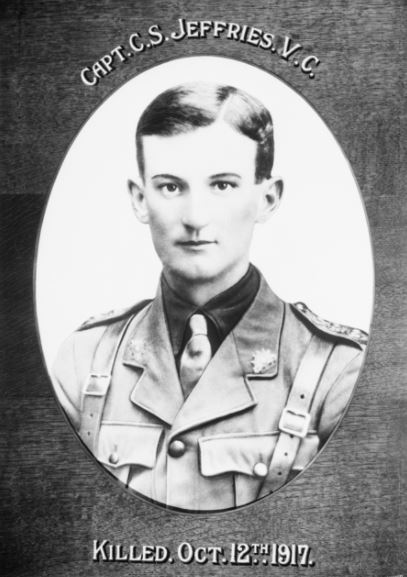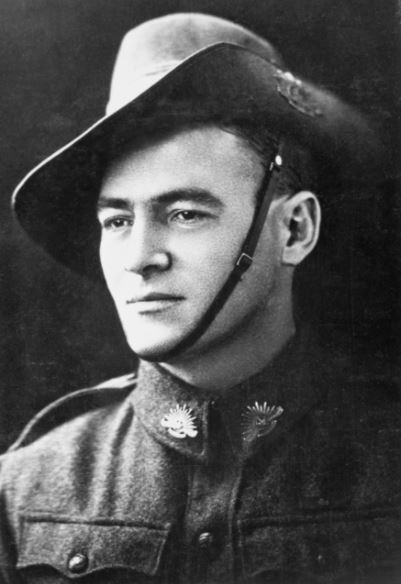Captain Clarence Smith Jeffries VC (1894 - 1917, 22yo)
 Clarence Jeffries was born on 26 October 1894 in Wallsend, New South Wales, and began his working life as an apprentice engineer after completing school. His military journey started unusually early, joining the militia at just 14 years old. Under the compulsory training scheme, he entered the 14th Hunter River Regiment in 1912 as a Private and rose swiftly through the ranks, becoming a Sergeant within a year. Commissioned as a Second Lieutenant in August 1914, he was promoted to Lieutenant by July the following year.
Clarence Jeffries was born on 26 October 1894 in Wallsend, New South Wales, and began his working life as an apprentice engineer after completing school. His military journey started unusually early, joining the militia at just 14 years old. Under the compulsory training scheme, he entered the 14th Hunter River Regiment in 1912 as a Private and rose swiftly through the ranks, becoming a Sergeant within a year. Commissioned as a Second Lieutenant in August 1914, he was promoted to Lieutenant by July the following year.
In February 1916, Jeffries transferred to the 34th Battalion, AIF, once again as a Second Lieutenant. He sailed for England in May and was promoted to Lieutenant in August. Deployed to the Western Front in November, he spent the early months of 1917 in the Armentières sector of France. Known for his strong leadership and admired by both subordinates and superiors, he was wounded during a reconnaissance patrol at Messines in June 1917, just days before being promoted to Captain.
On 12 October 1917, during the Third Battle of Ypres, Jeffries played a pivotal role in the attack on Passchendaele. When his company's advance was stalled by two fortified pillboxes, he led a bombing party that destroyed the positions, capturing four machine guns and thirty-five enemy troops. Despite intense shelling and machine-gun fire, he pushed his company forward to secure their objective. Later that day, while leading another assault to neutralise a machine-gun post threatening the battalion’s second objective, Jeffries was killed. For his exceptional courage and leadership, he was posthumously awarded the Victoria Cross.
Captain Jeffries was laid to rest at Tyne Cot Cemetery near Passchendaele. Following his mother's passing, his Victoria Cross was entrusted to Christ Church Cathedral in Newcastle, where it remains a lasting tribute to his sacrifice.
Private Joergen Christian Jensen VC (1891 - 1922, 31yo)

Joergen Jensen was born on 15 January 1891 in Loegstoer, Denmark, and migrated to Australia in March 1909. He found work as a labourer in South Australia and became a naturalised citizen on 7 September 1914 in Adelaide. With the outbreak of war, he enlisted in the AIF on 23 March 1915 as a Private and was assigned to the 6th Reinforcements of the 10th Battalion. Jensen joined the unit at Gallipoli in August 1915.
After the battalion withdrew from Gallipoli in November, they regrouped on the island of Lemnos and later moved through Egypt to France in March 1916. Jensen was wounded in action on 14 August 1916, and following his recovery, he transferred to the 50th Battalion in January 1917.
On 2 April 1917, during an attack on the village of Noreuil along the Hindenburg Line, Jensen displayed extraordinary initiative and courage. When his battalion came under heavy enfilade fire from a German machine-gun post, he and another Private charged the position. Using grenades, Jensen eliminated the gun crew and forced the remaining defenders to surrender, capturing approximately forty prisoners. His actions enabled the battalion’s advance and contributed to the eventual capture of the village. For this, he was awarded the Victoria Cross.
Jensen continued to serve on the Western Front, fighting at Messines in June 1917. He was promoted to Corporal and posted to a training unit in the UK the following month. Returning to his battalion in October, he became a temporary Sergeant in November. In 1918, during the German spring offensive, Jensen fought at Dernancourt and Villers-Bretonneux. Shortly afterwards, he was severely wounded in the head while on patrol and was evacuated to the UK before being repatriated to Australia.
Discharged at the end of the war, Jensen settled in Adelaide, working as a marine store dealer. He married in 1921, but his health never fully recovered from the war. He died the following year, a decorated veteran whose bravery had earned him Australia’s highest military honour.
Last Reviewed 06/2025









